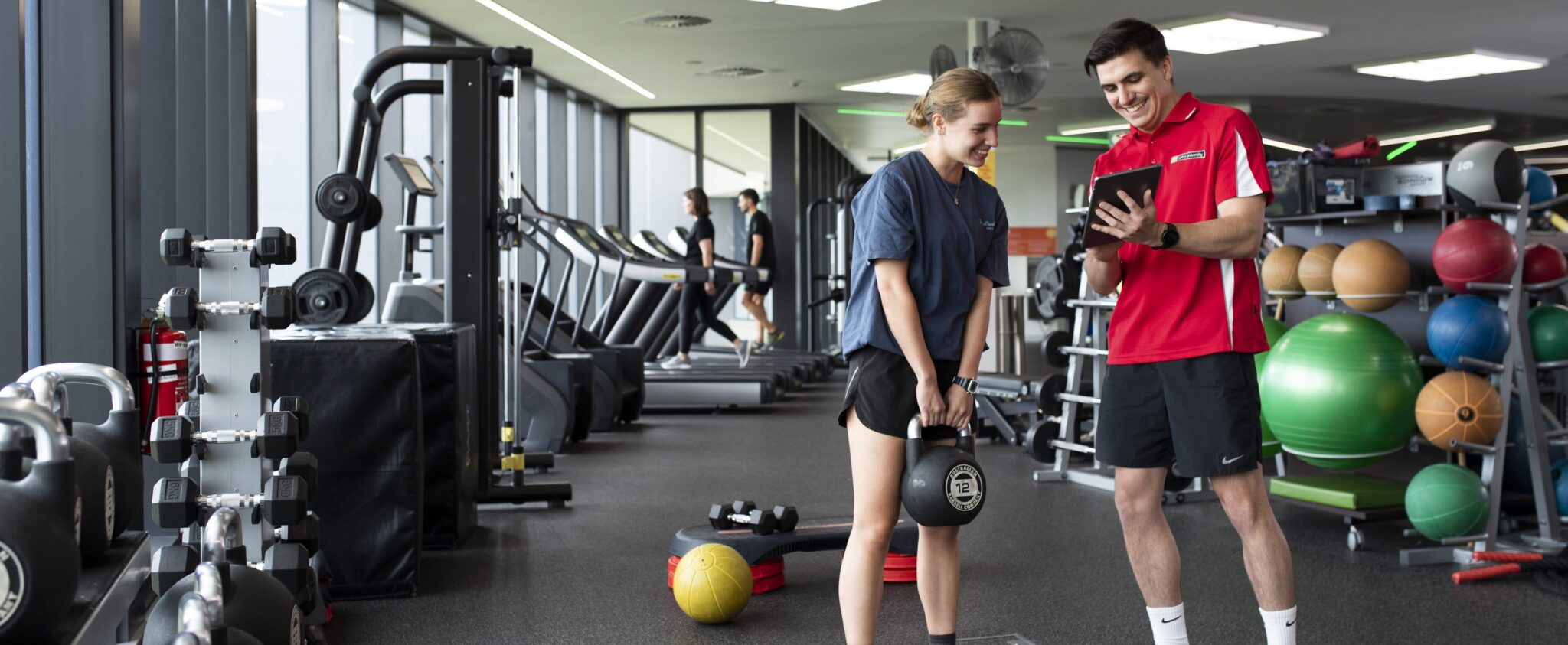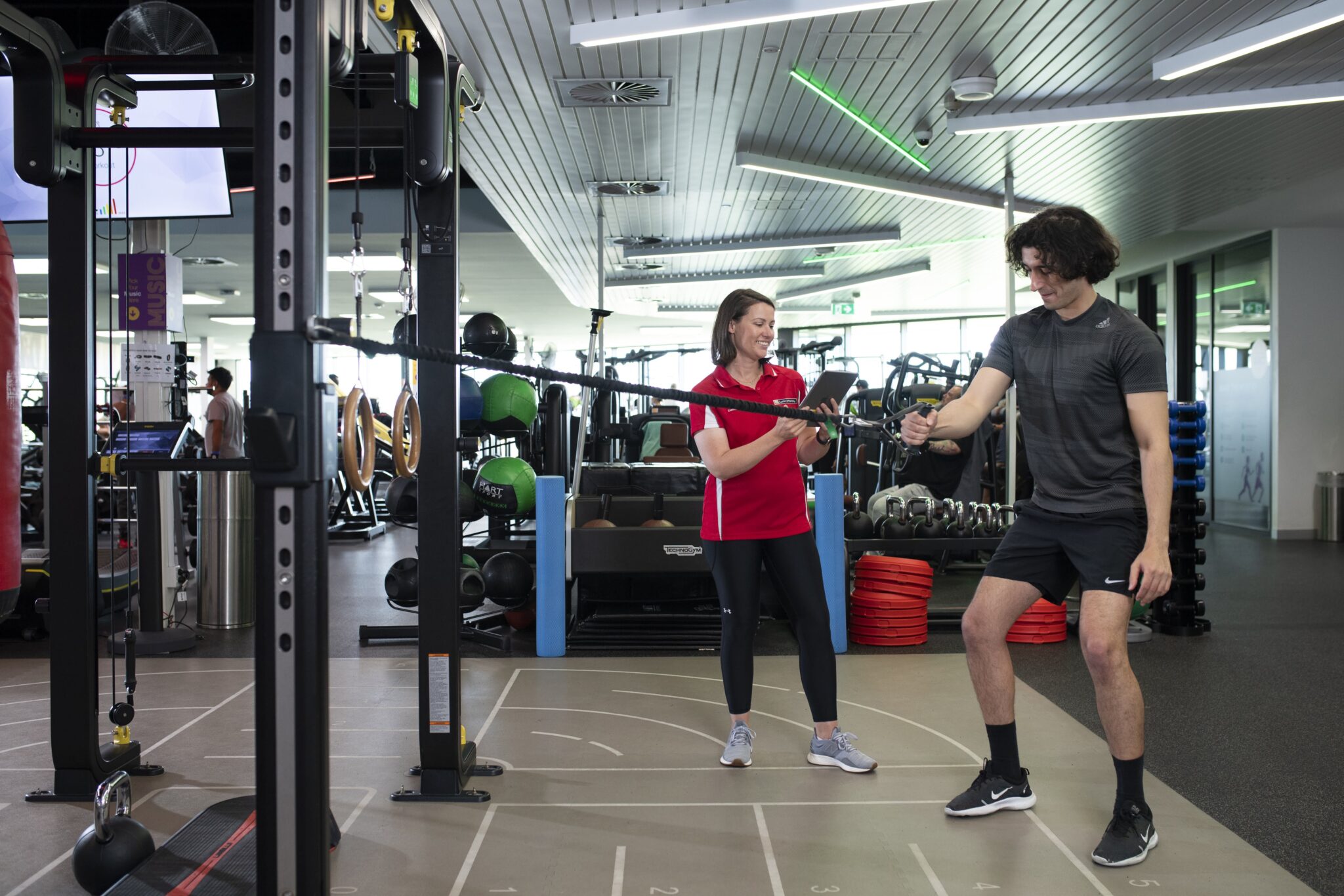Picture this: you’re watching an athlete breaking an Olympic record, cheering a friend on as they cross the finish line in their first big run … or you’re noticing a parent or family member move more freely, enjoying active hobbies and feeling better than ever.
No matter the size or scale of the achievement, chances are that somewhere along the way the expertise of an exercise or sports science graduate has played a role. Whether it’s by improving health and physical fitness or preventing injuries, experts in exercise are applying new research and cutting-edge data science to optimise the performance and wellbeing of their clients.
For this reason, a career in exercise science is exciting, impactful, and in-demand in Australia. The role of exercise physiologist was named by LinkedIn among the fastest-growing jobs in Australia in 2023 (and becoming an Accredited Exercise Physiologist starts with a degree in Exercise and Sport Science!).
According to the 2025 ACSM Worldwide Fitness Trends report, Australians are prioritising evidence-based fitness programs, wearable technology, and personalised training more than ever. And with Gen Z embracing running clubs as the new social scene, it’s clear that movement and fitness are more than just trends – they’re part and parcel of a lifestyle revolution.
Given that you’re passionate about fitness, sport and health, a degree in exercise science can open doors to dynamic career opportunities in Australia and abroad. And if you want to become an exercise scientist, fitness and performance consultant, strength and conditioning coach, or work in corporate health, preventative health, or research and development, studying exercise and sport science at Curtin University – our School of Allied Health is ranked #13 in the world and #1 in WA for Sports Science Schools and Departments (ShanghaiRanking, 2024) will provide the foundation for a fulfilling career.
What can you do with a degree in Exercise and Sports Science?
In the Bachelor of Science (Exercise and Sport Science), you’ll specialise in human performance – delivering exercise programs for health and wellbeing, athletic performance, and the prevention and management of injury and disease.
The skills you’ll develop will position you strongly for a wide range of roles across diverse industries. Depending on your chosen path, you might assess an individual’s strength, endurance, and flexibility; design and deliver tailored exercise programs for people with specific needs – including children (to improve motor skills, strength, and physical activity), NDIS participants, or individuals living with chronic conditions; or contribute to research aimed at enhancing athletic performance. You could also play a key role in creating and implementing health and wellbeing initiatives in corporate, government, or mining sectors. The possibilities are endless – your career could take you just about anywhere!
The rundown: 10 exciting roles in exercise and sport science
A degree in exercise and sport science can start you on the path to many rewarding careers. From working in community sports to improving workplace wellness, here are some exciting careers you could pursue (please note: some roles may require further study or accreditation beyond your undergraduate degree).

Exercise scientist
If you’re interested in applying scientific principles to assess and improve human movement and physical activity, then the role of exercise scientist might be for you. Plus, it’s the sort of skillset that’s transferable across many settings; you could work in research, healthcare, elite sport … or, across the span of a career, all of them!
💰Average salary: $60,000–$75,000 per year (Jora)
Strength and conditioning coach
As a strength and conditioning coach, you’ll design targeted training programs to help people improve their strength, speed, and endurance. You may work with elite sports teams, universities, or private training facilities either in a 1-on-1 or in a group capacity.
💰 Average salary: $68,000–$85,000 per year (Glassdoor)
Workplace wellbeing advisor
Improving employee productivity and delivering positive health outcomes is a key focus for workplaces across the world. By focusing on corporate health and workplace injury prevention, you’ll be playing an important role in keeping the workplace moving in the right direction. You could work with government agencies, private companies, healthcare organisations … wherever there’s human resources to manage, there’s the need for a wellbeing advisor.
💰 Average salary: $100,000–$105,000 per year (Seek)
Health and fitness assessor
Clipboard (or, more likely, iPad) at the ready! As a health and fitness assessor, you’ll evaluate the physical capacity of individuals in workplace and community settings – often as part of pre-employment screenings or health checks. You might work on government health initiatives, in occupational health clinics, or with organisations focused on worker safety and wellbeing. (Note: some roles may require additional qualifications in occupational health and safety.)
💰 Average salary: $65,000–$75,000 per year (Jora)
Sports and athletic development officer
As a sports development officer, you’ll work within local councils, government agencies and sporting bodies to create and manage school, community and elite-level sports programs. You’ll use your expertise to encourage participation and help others develop their skills; a rewarding position with plenty of time spent in your community.
💰 Average salary: $65,000–$70,000 per year (Glassdoor)
Cardiac technician (preventative health and early intervention)
According to the Australian Bureau of Statistics, “an estimated 1.3 million Australians aged 18 and over (6.7% of the adult population) were living with one or more conditions related to heart, stroke and vascular disease [in 2023].”
As a cardiac technician, you’ll work alongside cardiologists and other medical professionals to capture, record and analyse heart activity. Focusing on preventative health and early intervention, you’ll work in hospitals, private clinics, and even research institutions.
💰 Average salary: $60,000–$80,000 per year (Jora)
Corporate health consultant
As a Corporate Health Consultant, you’ll be the workplace wellness guru, designing programs that keep teams healthy, happy, and (mostly) stress-free. You’ll develop strategies for movement, stress management, and injury prevention. Plus, you’ll work with HR and leadership to build a culture where wellness isn’t just a buzzword – it’s part of the job description.
💰 Average salary: $64,000–$110,000 (Glassdoor).
I chose Mineral Resources at Yilgarn as my placement as I wanted to see where my degree could be used in areas other than sports and pre-employment checks.
I enjoyed building rapport with my clients. My daily tasks included taking workers through a dynamic stretching routine before their shift, and personal training sessions ranging from bootcamp style to general strength and hypertrophy-based exercises. I also completed supervised ergonomic assessments of admin and IT staff. The placement is a good way to gain a lot of practical experience in a short period of time.
Kye Kocken, Bachelor of Science (Exercise and Sport Science)
Health promotion officer
Get active in your community by getting your community active – as a health promotion officer you’ll develop and implement programs aimed at improving public health and encouraging active lifestyles. Work within varied industries, including government agencies, NGOs and healthcare organisations.
💰 Average salary: $80,000–$95,000 per year (Seek).
Defence Force fitness specialist
As a physical training instructor in the Australian Defence Force, you’ll support military personnel by designing and implementing fitness programs tailored for wellbeing and operational readiness – both in Australia and overseas.
💰 Average salary: $91,222 per year after training (ADF).
Mining health and wellness coordinator
In industries like mining, construction and resources, you’ll design wellness and injury prevention programs for workers in physically demanding roles.
Curtin Bachelor of Science (Exercise and Sport Science) graduate Sava Papos took the opportunity to practice what he’d learned under unique circumstances:
“I chose my placement at Mineral Resources for its remote location, challenging environmental conditions, and consequent challenges in delivering health care. I wanted to explore how this kind of organisation focuses on and delivers health care to its employees.
“I enjoyed the ongoing challenges of ensuring safety in jobs which involve repetitive and physical work over long hours … I absolutely recommend this course as it solidified that I am heading towards a career where I can help make a difference to people’s health.”
💰 Average salary: $85,000–$105,000 per year (Jora).
(Salary estimates retrieved April 2025.)
Getting started
There are multiple pathways into Curtin’s Bachelor of Science (Exercise and Sport Science). If you’re finishing Year 12, you can apply directly through TISC with an ATAR. Pathways outside ATAR include VET certificate IV and the UniReady Enabling Program. Check out the course page for up-to-date admission requirements (including desirable WACE subjects).
If you’re interested in clinical applications, our Bachelor of Science (Exercise and Sport Science) can lead directly into the ESSA-accredited Master of Clinical Exercise Physiology. This postgraduate qualification is essential for those aiming to become an accredited exercise physiologist, working in hospitals, rehabilitation centres and private practice to support clients with chronic conditions, injury recovery, and preventative health programs.
Why Curtin?
If you’re passionate about helping others achieve their best physical performance and lead a healthy life, a degree in exercise and sport science could be the perfect pathway for you.
At Curtin, you’ll gain hands-on experience in high-performance sports environments through professional placements that sharpen your skills and expand your industry connections. You’ll also learn from award-winning educators – Curtin’s Exercise and Sport Science team received a prestigious 2023 Australian Award for University Teaching, recognising their national leadership in relevant, real-world learning.
Thanks to our strong partnership with Fremantle Football Club, the world of elite sports is within your reach. You’ll have the opportunity to work alongside some of Australia’s top athletes, learning from the best in the field.
You’ll also benefit from Curtin’s collaboration with Cockburn ARC. Our dedicated teaching facilities at the ARC will give you access to state-of-the-art equipment and real-world learning experiences. You’ll complete a placement at ARC, giving you invaluable exposure to professional sporting environments and community health initiatives.
On campus in Bentley, we provide purpose-built facilities to support your learning, including our Exercise Physiology Lab and Strength and Conditioning Lab. These specialised labs offer cutting-edge equipment for practical learning and research.
Take a virtual tour of the Exercise Physiology Lab and the Strength and Conditioning Lab to explore our industry-standard learning spaces. If you’re passionate about exercise and sport science, there’s no better place to start your journey.
Explore Curtin’s Bachelor of Science (Exercise and Sport Science) and Master of Clinical Exercise Physiology.



